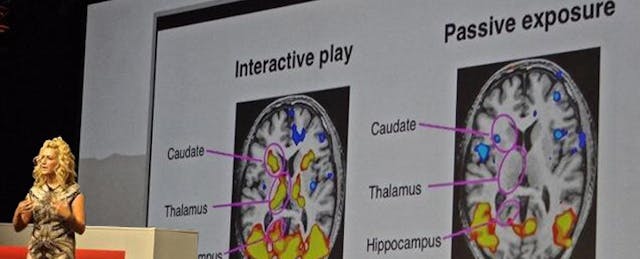Jane McGonigal likes to make history--and figured that was a great to way to jump start ISTE13. So she did.
McGonigal closed her ISTE13 keynote with a massive multiplayer thumb-wrestling match, a striking strategy for reinforcing her main points about the benefits and potential of gaming. The whole audience was fully engaged, curious, collaborating, feeling connected, and almost joyful. Participants felt like they were part of a larger “lofty” goal of beating a world record--albeit for thumb wrestling, having fun, and thinking creatively about strategy, all elements present when playing online games. Plus, it pulled everybody off their chairs, moving, and away from multitasking on digital devices. Yes, even the bloggers put down their tablets and phones.
McGonigal claims we collectively spend 3 million minutes every day playing Angry Birds, and that most college students spend more time playing video games than they spend on classwork. (One alarming statistic shared by McGonigal: over 92% of American 2-year-olds play video games!) She even showed a scan of the brain, indicating what parts of the brain light up when people either play--or just watch--games. (See above picture).
Imagine what could be accomplished if this intense energy shifted to another purpose. McGonigal suggests that Urgent Revoke, a massive online multiplayer game does just this; participants solve world problems such as world hunger, for example. Teachers and organizations can request free access.
McGonigal’s research shows that gamers spend 80% of their time failing, which, though counterintuitive, makes them want to continue to play the game. At an earlier ISTE Ignite session, Kill Off the Players, one presenter essentially made the same point: Gamers like games that kill off their players; the challenge of figuring out how to make it to the next level pulls them back to the game. The speaker suggested that when games prompt players with too many hints, players become less interested in continuing to play, not more so.
The lesson for education is direct: Give students too many of the answers before they solve problems on their own and we stifle their energy, too. Instead, educators need to help students recognize that failure is part of the process towards success.
Games may not hold the answer to solving our problems in education but it’s hard to argue against wanting students to experience the same emotions every day at school that they do when playing games. Shouldn’t students be fully engaged, collaborating, thinking critically, and working towards a goal larger than themselves? Dare we also mention that school should be fun, challenging, and rewarding?


